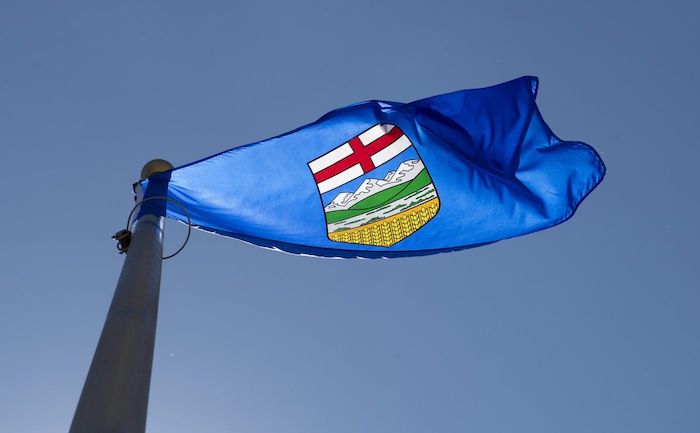Alberta
Alberta, Saskatchewan and Manitoba “Taking the lead on new nation-building projects”

Taking the lead on new nation-building projects
Alberta, Saskatchewan and Manitoba have signed an agreement to collaborate on joint economic corridor projects to boost trade and economic growth.
The signing of a memorandum of understanding between the governments of Alberta, Saskatchewan and Manitoba will foster the development of new economic corridors across the three provinces. This groundbreaking partnership aims to bolster economic growth and collaboration while strengthening the region’s position as a key player in the global market.
“Alberta is proud to partner with Saskatchewan and Manitoba, taking a leadership role in building new trade corridors that will help our provinces and our country. New nation-building projects need government cooperation and political will. We need to cut red tape. We need to get building things like we used to. We need to make good jobs and an affordable life a priority. We can start to show people that, yes, Canada is a place you can do business again.”
“The world needs what Saskatchewan has to offer. We rely on dependable, robust road, rail, air and port networks to ship our food, fuel and fertilizer across North America and around the globe.”
“Manitoba’s unique gateway and hub initiatives cannot develop in isolation, that is why external cooperative partnerships will leverage our initiatives for success. With similar trade and transport access such as distance to markets, reliance on international ports and railway services, and similar commodity basis, Saskatchewan and Alberta are natural key partners to work with on improving trade enablement through transportation.”
In its earliest days, Canada was united by nation-building economic projects such as the transcontinental railway, which tied the country together through improved travel and trade.
Over the last decade, regulatory uncertainty, anti-development policies and a lack of national leadership have cost provinces an opportunity to pursue projects that would have created thousands of jobs and billions of dollars in growth and investment.
The three provincial governments will work together to eliminate regulatory inefficiency and uncertainty to attract and develop nation-building projects. Alberta, Saskatchewan and Manitoba will coordinate to identify and prioritize strategic infrastructure that will enhance trade and transportation between the provinces and around the world. Through this, new economic corridors will be built to support the movement of critical resources, energy and utility projects, and secure national supply chains.
Quick facts
- The agreement will focus on enhancing critical infrastructure, improving the efficiency of interprovincial transportation networks and reducing regulatory hurdles. It will also identify opportunities to attract private sector investment and partner with Indigenous communities on economic corridor development.
- Economic corridors link markets in and out of Alberta, supporting the province’s economic, social and environmental activity.
- Economic corridors can involve a broad range of infrastructure, including transportation, energy, power, telecommunications and other utilities.
- In addition to physical infrastructure, corridors include service markets and the coordination of regulations and policies across multiple jurisdictions and sectors.
- According to Statistics Canada, Alberta exported more than $138 billion in goods in 2021.
- This includes goods shipped by pipeline and other modes, such as road, rail, air and marine.
- Non-pipeline exports of goods totalled more than $48 billion.
- Alberta Transportation and Economic Corridors will work and proactively partner with Indigenous communities to plan economic corridors for mutual economic benefit.
Alberta
Former senior financial advisor charged with embezzling millions from Red Deer area residents

News release from Alberta RCMP
Former senior financial advisor charged for misappropriating nearly $5 million from clients
On April 4, 2024, the RCMP’s Provincial Financial Crime Team charged a Calgary resident for fraud-related offences after embezzling millions of dollars from his clients while serving as a senior financial advisor.
Following a thorough investigation, the accused is alleged to have fraudulently withdrawn funds from client accounts and deposited them into bank accounts he personally controlled. A total of sixteen victims were identified in the Red Deer area and suffered a combined loss of nearly $5 million.
Marc St. Pierre, 52, a resident of Calgary, was arrested and charged with:
- Fraud over $5,000 contrary to section 380(1)(a) of the Criminal Code; and,
- Theft over $5,000 contrary to section 344(a) of the Criminal Code.
St. Pierre is scheduled to appear in Red Deer Provincial Court on May 14, 2024.
“The ability for financial advisors to leverage their position to conduct frauds and investment scams represents a significant risk to the integrity of Alberta’s financial institutions. The investigation serves as an important reminder for all banking clients to regularly check their accounts for any suspicious activity and to report it to their bank’s fraud prevention team.”
- Sgt. John Lamming, Provincial Financial Crime Team
The Provincial Financial Crime Team is a specialized unit that conducts investigations relating to multi-jurisdictional serious fraud, investments scams and corruption.
Alberta
Political parties will be part of municipal elections in Edmonton and Calgary pilot projects

Strengthening Alberta’s local elections
Alberta’s government is introducing legislation to ensure Albertans can rely on transparent, free and fair elections, and municipally-elected officials have clearer accountability measures.
In a democratic society, Albertans expect their local elections to be free and fair, and their elected officials to be held to account by clear rules that govern their local councils. The Municipal Affairs Statutes Amendment Act proposes amendments to the Local Authorities Election Act (LAEA) and the Municipal Government Act (MGA) to add greater transparency to local election processes and ensure local councils and elected officials continue to remain accountable to the citizens who elected them.
“Our government is committed to strengthening Albertans’ trust in their local governments and the democratic process that elects local leaders. The changes we are making increase transparency for Alberta voters and provide surety their votes will be counted accurately. We know how important local democracy is to Albertans, and we will work with local authorities to protect and enhance the integrity of local elections.”
Local Authorities Election Act
Albertans expect free and fair elections and that’s why it’s important we strengthen the rules that govern local elections. To strengthen public trust in local elections, Alberta’s government will eliminate the use of electronic tabulators and other automated voting machines. All Albertans should be able to trust the methods and results of local elections; requiring all ballots to be counted by hand, clarifying rules and streamlining processes for scrutineers will provide voters greater assurance in the integrity of the results.
All eligible Albertans should be able to vote in local elections without impediment. Alberta’s government will limit the barriers for eligible voters to cast a ballot by expanding the use of special ballots. Currently, special ballots can only be requested for very specific reasons, including physical disability, absence from the municipality, or for municipal election workers. By expanding the use of special ballots, the government is encouraging more voter participation.
Amendments in the Municipal Affairs Statutes Amendment Act would increase transparency in local elections by enabling political parties at the local level. Political parties would be enabled in a pilot project for Edmonton and Calgary. The act will not require candidates to join a political party in order to run for a local or municipal office, but will create the opportunity to do so.
In addition, proposed changes to the Local Authorities Election Act would allow municipalities the option to require criminal record checks for local candidates, thus increasing transparency and trust in candidates who may go on to become elected officials.
Municipal Government Act
The role of an elected official is one with tremendous responsibility and expectations. Changes proposed to the Municipal Government Act (MGA) will strengthen the accountability of locally elected officials and councils. These include requiring mandatory orientation training for councillors, allowing elected officials to recuse themselves for real or perceived conflicts of interest without third-party review and requiring a councillor’s seat to become vacant upon disqualification.
If passed, the Municipal Affairs Statutes Amendment Act will also unlock new tools to build affordable and attainable housing across Alberta. Proposed amendments under the MGA would also create more options for municipalities to accelerate housing developments in their communities. Options include:
- Exempting non-profit, subsidized affordable housing from both municipal and education property taxes;
- Requiring municipalities to offer digital participation for public hearings about planning and development, and restricting municipalities from holding extra public hearings that are not already required by legislation; and
- Enabling municipalities to offer multi-year residential property tax exemptions.
Municipal Affairs will engage municipalities and other partners over the coming months to hear perspectives and gather feedback to help develop regulations.
Quick facts
- The LAEA establishes the framework for the conduct of elections in Alberta municipalities, school divisions, irrigation districts and Metis Settlements.
- The MGA establishes the rules governing the conduct of local elected officials once on council, as well as the overall administration and operation of municipal authorities in Alberta, including any policy those authorities may wish to implement.
Related information
-

 COVID-191 day ago
COVID-191 day agoPfizer reportedly withheld presence of cancer-linked DNA in COVID jabs from FDA, Health Canada
-

 Censorship Industrial Complex2 days ago
Censorship Industrial Complex2 days agoJordan Peterson, Canadian lawyer warn of ‘totalitarian’ impact of Trudeau’s ‘Online Harms’ bill
-

 COVID-191 day ago
COVID-191 day agoTrudeau gov’t has paid out over $500k to employees denied COVID vaccine mandate exemptions
-

 National1 day ago
National1 day agoAnger towards Trudeau government reaches new high among Canadians: poll
-

 International24 hours ago
International24 hours agoRFK Jr tells EWTN: Politicization of the CIA, FBI, Secret Service under Biden is ‘very troubling’
-

 Opinion2 days ago
Opinion2 days agoThe Climate-Alarmist Movement Has A Big PR Problem On Its Hands
-

 Brownstone Institute2 days ago
Brownstone Institute2 days agoThe Teams Are Set for World War III
-

 Addictions22 hours ago
Addictions22 hours agoWhy can’t we just say no?






